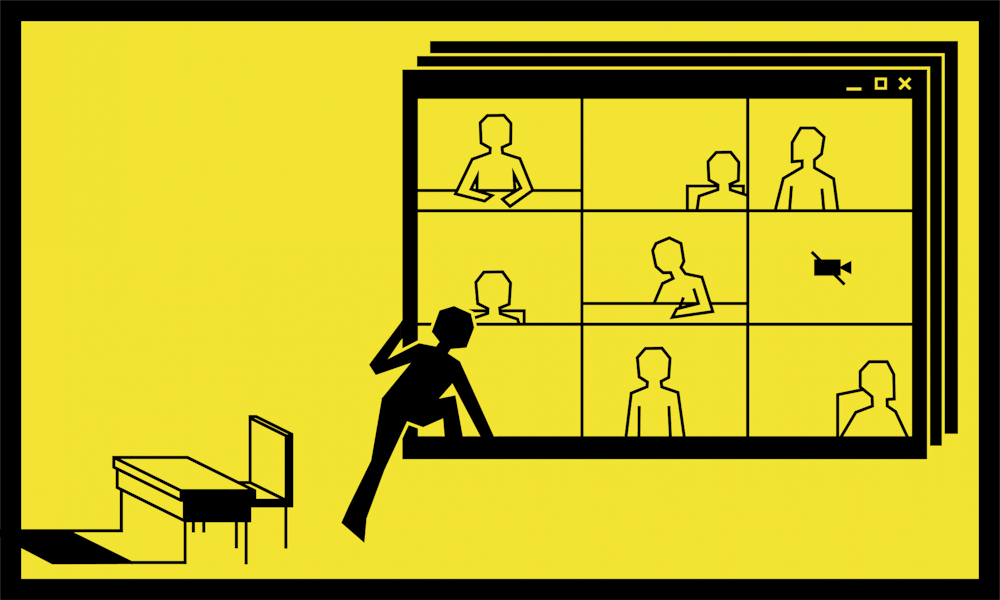
In less than two weeks, many incoming first-year and transfer students will start their Penn career away from campus and in their childhood bedrooms — a far cry from the experience they expected after submitting their applications last year.
To help Penn's new students navigate this uniquely challenging semester, The Daily Pennsylvanian asked upperclassmen and professors for advice about how to succeed in college amid the coronavirus pandemic.
Here are our favorite takeaways:
1) Get to know your professors. Go to virtual office hours.
“Don’t be afraid to go to virtual office hours for help, even if it may seem daunting at first.”
– College sophomore Jessica Hao
“Since April, I’ve had many one-on-one and small group virtual chats using Google, Microsoft, Zoom and BlueJeans. These interactions have allowed me to get to know people on a deeper level – in a way that actually may have been harder in a crowded, noisy face-to-face environment. So please reach out. We want to know you … and we’ve been as isolated as you have!”
– Marketing Professor Cait Lamberton
"Ask for help when you need it. Offer help when you can. Approach this semester with a beginner’s mindset. Writing seminar will probably be your smallest, most personal class this semester. Come to virtual office hours! Make use of the small group assignments to make friends and set up study groups beyond writing sem.”
– Critical Writing Seminar professor Hannah Byland
“Over-communicate. I found that that was helpful. Communication is already hard in person. But over-communicating what’s going on in my life with professors, if I’m having challenges. Over-communicating if I submitted an assignment, over-communicating if I really enjoyed an assignment. It’s easy for things to get lost in translation, I think, in a Zoom meeting. And not for participation credit, just to make sure you’re really connecting with people and reaching them.”
– College senior Madison Sanders
2) Establish a routine. Don’t just roll out of bed.
“Create your own daily routine, one that involves restful sleep, healthy nutrition, and physical activity. Make sure to find time to savor simple pleasures like creating a gratitude list. If you skip this basic step, everything else downstream will be much harder.”
– Chief Wellness Officer Benoit Dubé
“Make yourself actually [stay] on top of your classes. Last semester when a lot of my lectures were just recorded – so technically you didn’t even have to sit down and actually view it and take notes during the lecture time – I just got lazy and stopped actually doing it … and then they started piling up and it was this huge headache. So I think that’s a big piece of advice I’m going to try and follow this semester too.”
– College junior Emma Van Zandt

“Don't get down on yourself or get frustrated with yourself if you feel like your attention span isn't as long as it might be in a regular learning environment, or you can’t stay focused as well, because I think that that's a universal experience. It's going to be more difficult than in-person learning. I think that’s just a given. Don't get too frustrated with yourself because ultimately that frustration will just make it harder.”
– College senior Sarah Simon
3) Meet people virtually and find creative ways to get involved in the Penn community.
“Do what you normally may hesitate to do in person. Reach out to upperclassmen you find on social media or at a club recruiting event with similar interests and schedule time to chat."
– Wharton junior Namrita Narula
“Make time for the things that truly make you happy. In virtual college it may seem hard to find these things, but lean on those around you and try different things. Zoom calls, socially distanced and safe meetups, virtual game nights. It’ll take some adjustment, but you can do it.”
– Engineering junior Priya Kumar
“Even while we are socially distant, you can continue to build your chosen family. We know that sometimes folks may be looking forward to the college experience to be able to truly embrace themselves in a way that doesn't have so many of the constraints that sometimes comes with being at home, or coming from a younger age. So don't be afraid to still reach out, build those connections, and continue to cultivate [your] chosen family.”
– Associate Director of the LGBT Center Malik Muhammad
“Take 10 or 15 minutes in the next couple weeks to go through [the platform Penn Clubs] to figure out if there are any groups that stick out to you that you want to learn more about, or might want to talk to some upperclassmen or their club president [about]. … Get to know their clubs for exactly what they would be if everyone was on campus together. It sucks that so much of the impetus is on you as the student to do that reaching out, but once you make that initial push everyone is so excited to help you grow and help you succeed.”
— College junior and Student Activities Council President Grayson Peters
4) Disconnect from technology.
“Take a break and disconnect from social media — and the news! Since there are a lot of things going on over which we have no control (I’m talking about you, COVID-19), it’s especially important to claim your agency over things you can control, like choosing to take a break from social media and the news. Go outside and hit pause every day — but don’t forget your mask!”
— Chief Wellness Officer Benoit Dubé

Overlooking the Schuylkill River Trail from Walnut Street.
“If you have that 10 minutes, don't just spend it at your computer, looking through Facebook or checking your email. Actually step away for a moment, step outside. I think that will actually make the learning experience more effective, if you're not just at your computer all day.”
— Associate Director of the LGBT Center Malik Muhammad
5) Take care of yourself, and don't try to do too much at once.
“During the pandemic, my teenage daughters and I have had many skirmishes, and the one that has bothered me the most has to do with coffee cups being left on the kitchen counter. Daily, I have made speeches about how we can't do this and expect the counter to remain unstained. To no avail. It got so irksome to me that I asked a therapist for advice (and by the way, therapy is great – I recommend it). "Why not put a tray where the coffee cups are?" she asked. I found an old tray in a closet, put it out, and presto: no more coffee stains on the counter. The moral of the story? The pandemic has heaped enough stress and suffering upon us in 2020 to last a lifetime. Pick your battles. Better yet: figure out a solution that requires no fighting at all. And remember what I said about therapy. You'll get through 2020 no matter what, but it will be easier if you have a therapist as an ally."
– Psychology professor Angela Duckworth
“It’s dangerous to try to do too much, especially in your first semester. It’s a huge adjustment, whether you’re going to be on campus or off campus. You’re much better off doing less and doing well and staying mentally healthy than you are overextending yourself and getting stressed out and worried and sort of losing your bearings.”
– Dean of the College of Arts and Sciences and Biology professor Paul Sniegowski
"Thinking especially of first-year students, I might suggest being easier on yourself than you think is reasonable. So many paradigms are shifting. Grades really don’t matter as much as investment in connection – however the chance for connection might come.”
– English professor Taije Silverman
“This is a marathon, it's not a sprint. So, if you haven't done everything that you imagined doing in your college career by the end of the first semester, that's okay, because you've got another seven semesters to go.”
– Associate Professor of Classical Studies and Faculty Director of Lauder College House Cam Grey

6) Manage your expectations and go with the flow.
“Try not to compare what you thought your experience was going to be this year to what it ends up being, because it's going to be really hard to find the enjoyable aspects of it if you just keep on thinking about how different this is than what you thought it was going to be.”
– Engineering sophomore Caleigh Dennis
“Realize that there are going to be a lot of different people from a lot of different places from a lot of different experiences. Don't get caught up in titles. Realize that it's up to you to make your life what you make it, nobody else's, and that you can't be jealous of other people.”
– Wharton sophomore Frank Lapinski
7) As you adapt to the challenges ahead of you, remember that no one has everything all figured out.
“People feel naturally insecure about how fast they've been making new friends, but don't sweat it … people are faking it just as much as you are.”
– College junior Michael Nevett
“No one has it figured out. No one else knows what they’re doing, probably even the seniors who look like they have it figured out, they don’t.”
– College senior Madison Sanders
"Understand that we know that you’ve got all of our stories beat at the moment. You started college in a pandemic. You win. And we’re impressed by, and proud of, what you’re doing by continuing your education during this time. … You are now part of reinventing the millenia-old university paradigm in a way the world has literally never seen. Undoubtedly, there are huge challenges and frustrations ahead of us – but recognize the huge impact you can have. Recognize that we need your creativity and ideas, your tenacity and your vision, to re-invent higher education for a new world.”
– Marketing professor Cait Lamberton
The Daily Pennsylvanian is an independent, student-run newspaper. Please consider making a donation to support the coverage that shapes the University. Your generosity ensures a future of strong journalism at Penn.
Donate



